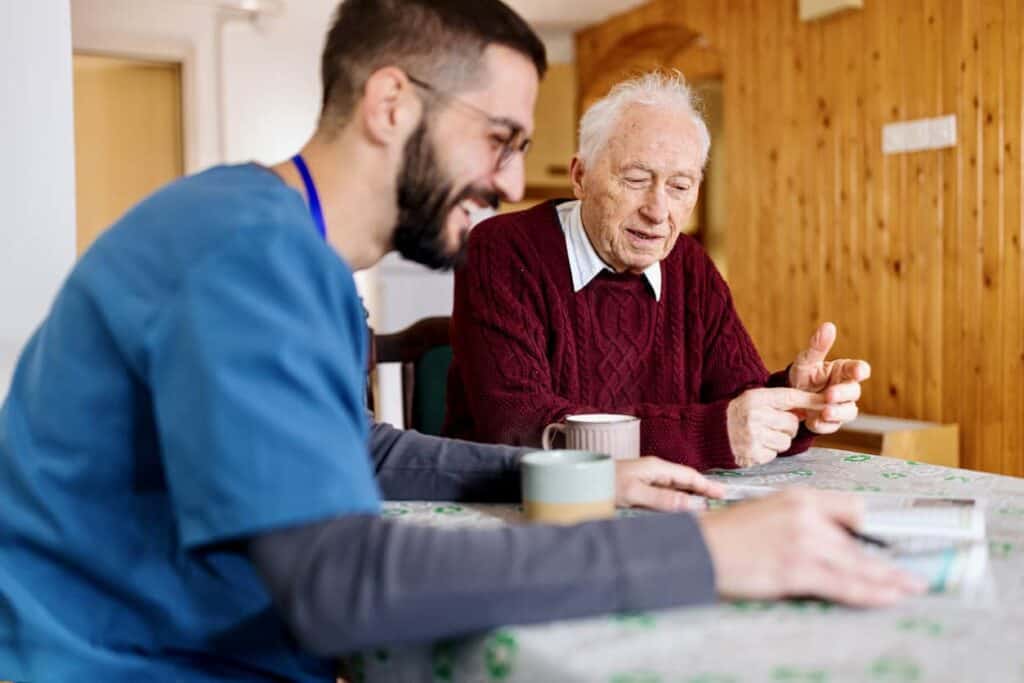brandkit
Brand Kit Brand Kit Brand Colors #CC2C7C #DC4C5C #020202 #989898 #FFFFFF Logos & Icons Small Logo Download Copy Link Brand Icon Download Copy Link
Today, we rely on highly sophisticated equipment such as alarm systems and door or gate video cameras to help us stay safe from crime and abuse. However, according to an FBI report published earlier this year, cybercrimes are on the rise and have robbed us of more than 10 billion USD in 2022. A sum that is almost double compared to 2021.
Even more astonishing is the statistic that the United States holds first place in the world with almost 500,000 victims of cybercrime in 2022. In comparison, the UK comes second with 280,000, and Canada is third with a mere 5,500 reported cases.

Surprisingly, or perhaps not so much, people 60+ years old are the age group that lost the largest amount of money to cybercrimes in 2022. And according to investigators, only one in twenty elderly victims of scams would report it to the police. Unfortunately, even if the crimes get reported, the authorities’ most frequent response is, ‘There is nothing we can do.’
Parallel to the inadequate measures of the institutions, cybercriminals are becoming better and ever more difficult to detect. With the general population aging, cybercrime investigators are urging authorities, businesses, and financial establishments to join forces and come up with a system that would protect senior citizens more effectively.
Until then, however, we must stay informed and help our parents or elderly relatives develop the skills needed to safeguard themselves against fraudsters and imposters.
A useful resource for you in this journey can be Amy’s Eden, with our professional caregivers and sitters who are aware of the treacherous online world. Our personnel is well-equipped to deal with situations of distress and can help your loved ones navigate and not fall victim to emotional and financial swindlers.

Being scammed has nothing to do with being stupid or careless. It is a common misconception that the elderly fall victim to swindlers because of their declined cognitive abilities or their lack of experience with technology. In fact, with today’s AI (artificial intelligence) technology, even tech-savvy people who are working online daily can easily be tricked.
That being said, online hoaxes went through the roof for the first time during the pandemic when our parents went online to stay connected with us and shop. Today, experts say that about 95% of computer hacks and identity thefts happen when a person clicks on a text message or a link or provides personal information over the phone.
Con artists often act as friendly, trustworthy, and helpful. They may pretend to be bank officers, telemarketers, strangers, or someone your beloved senior already knows. Sometimes, even family members with money problems can commit financial abuse on the elderly.
Overall, the elderly can be scammed online and offline. Their age group is perceived as more vulnerable or good targets for scams because seniors often live alone, have disabilities, or they are more trusting in others and doubtful of their own abilities, especially regarding online banking and other services. Therefore it is great to have someone trustworthy beside them.
The main goal of all scammers is to pilfer financial resources. Most often, fraudsters trick older adults into giving them money by
Among the most frequent scams happening with the help of the internet are:

Being perhaps the most common fraud, phishing scams use unsolicited email, telephone calls, and text messages, feigning a representative of a legitimate company requesting personal information, financial information, and/or login credentials. Links leading to fake websites, bogus texts from authorities, faux emails, or calls asking for personal information have become part of everyday reality.

Creating a fake online profile with sham photos of others is what these fraudsters do. The goal is to establish an emotional relationship with a lonely older person, typically through social media, dating websites, or online forums. The term “catfish” originated from the 2010 documentary film called “Catfish,” which explored a particular case of online deception.
The requests for money that catfish scammers make are often related to:

Scammers impersonate Medicare representatives or healthcare providers, attempting to gather personal information or sell fake medical products or services.
To conduct this, scammers use pop-up messages created by spam ware, in which they pose as technical support representatives from reputable companies. They declare the older adult’s computer has a problem and request remote access or payment in order to remove the issue.

Together with online scams, there are other ways seniors are also repeatedly targeted. Such are:
Fraudsters approach older adults offering home repairs or improvement services at discounted rates, but they either perform substandard work or vanish after receiving payment upfront.
Scammers pose as representatives of legitimate charities, especially after natural disasters or during holiday seasons, and request donations that they pocket for personal gain.
Using cold calls, scammers try to scare or trick seniors into offering their bank, credit card, or personal information with the intention of committing identity theft or selling them fictitious goods.
As awful as all these fraudulent schemes sound, it is possible to prevent them from happening to our loved ones. Following the advice below can save your family a lot of trouble.



[alt txt: ]
In addition to the preventive measures you and your loved ones can take, having a professional caregiver on hand can give you an extra layer of defense, and peace of mind.

The elderly are often targeted because they are perceived as lonely, gullible, and vulnerable. Imagine your loved one is spending their time with a reliable, caring, and friendly professional who is also helping them with daily activities and accompanying them while running errands. It would be much harder for swindlers to approach or try to deceive them.
Here are some additional ways to protect your loved one from senior fraud.
If you or your loved one have already become a victim of a scam, there are measures you can take. The most important advice is to act swiftly. Report the crime, compile all information you have about the fraud and the perpetrators, and follow the advice given in this article.
Scamming the elderly has become more prevalent than ever due to the increase of online activities and the freely available sophisticated AI technologies.
While the National Council on Aging, in partnership with federal agencies and consumer rights organizations, is dedicated to combatting scams targeting the elderly population, unfortunately, the authorities and the financial institutions do not have adequate plans for counteraction. Thus the protection of our resources and the savings of our elderly relatives are left to us.
This starts with informing ourselves and preparing our aging loved ones for what to expect. Educate them using our expert tips above to be responsible online shoppers and to exercise a healthy skepticism toward any new ‘friends.’
Among the steps you can take to protect or prevent your senior beloved from being scammed is employing a professional caregiver who can provide another layer of safety in their life.
Amy’s Eden caregivers are vetted and equipped to keep your loved one from getting scammed. We also provide a variety of caregiving services to give your beloved senior the assistance they need. Contact us today to learn more about how we ca
Get care >
Brand Kit Brand Kit Brand Colors #CC2C7C #DC4C5C #020202 #989898 #FFFFFF Logos & Icons Small Logo Download Copy Link Brand Icon Download Copy Link

Are you worried your loved one isn’t sleeping well? Do you notice them tossing and turning, napping in the afternoon, or complaining about fatigue most

There’s something deeply comforting about aging in a place that feels like home—the familiar walls, the cherished memories, the sense of belonging. For many older

Caring for an elderly loved one is a journey filled with love, challenges, and a lot of questions. One of the biggest questions you might

